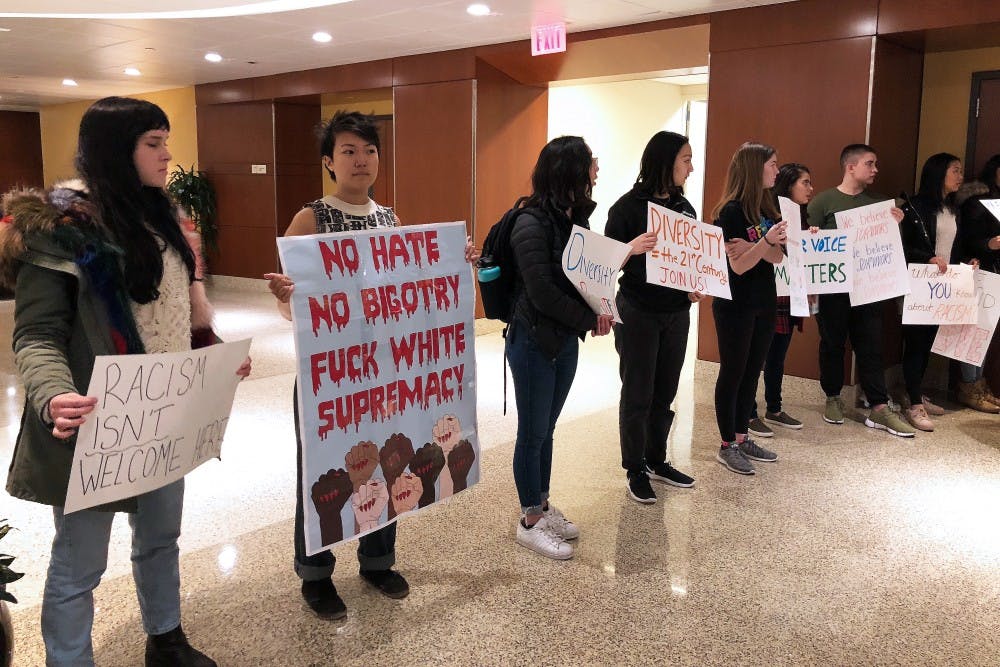
Punch a Nazi. Egg a Senator. Participate in protests. Post your opinions online. Basically, do more.
Penn students, often criticized for living within an insulated and protected bubble of coddled co-dependence on each other and their parents, have an increasing opportunity in today’s polarized day and age to do more. With most of us just recently graduating and leaving our high schools in the midst of mass shootings, coming of age in the era of Trump’s candidacy and election, and having technology perpetually at our fingertips, we are responsible for being politically and actively engaged.
Receiving an education — from a prestigious university nonetheless — is a gift and tool that we are mandated to wield. Penn students, no matter your socioeconomic status or demographic, all have a level of privilege not afforded to students attending a lower-tier university or not attending a university at all for whatever reason. We have been set loose on a campus full of resources and connections, and if we don’t use these valuable tools to make political statements, gain local or national coverage, or impact even the space of our surrounding community, then we are wasting the privilege Penn has afforded us.
Last year, multiple student groups on Penn’s campus organized rallies protesting the repeal of DACA. In February of this year, scores of students gathered to protest Heather Mac Donald for a discriminatory speech at an event hosted by The Statesman. Members of Penn Democrats marched in the annual Women’s March, as well as many other students not affiliated with a specific Penn club or group. All of these gestures of activism are important examples of the kind of driven and involved students Penn houses, and the efforts of these groups should not be overlooked within the larger context of a bid to do more.
But in fall 2018, Penn boasted 25,860 total students, 21,960 of whom are full time, and 10,605 of whom are undergraduates. If we consider the two dozen students and faculty who lined up in the rain on February 22nd to protest gun violence, that’s only 0.22 percent of total undergraduates. We must do better. We must do more.
We forfeited our rights to be apathetic about politics when we chose to attend an influential university with resources and connections. Advocate for the causes you feel particularly motivated by. You don’t have to organize a protest against every political decision you disagree with, and honestly, who has the time? But the larger issues that affect students in particular, such as an admissions scandal that highlights the severe disadvantage of lower income students within the framework of college acceptances, is a good place to start.

Minority student groups covered Penn's LOVE statue with notes about the experiences of being an Asian-American woman after a discussion titled "Reclaiming the Exotic" in the Penn Women's Center.
Political engagement can be as simple as reading articles instead of just the headlines, being knowledgeable about the state of our country, or sending the occasional tweet. I understand the impulse to keep one’s social media clear of politics for employment sake. But that doesn’t bar you from participating in peaceful protest, organizing petitions, attending informative guest lectures, and simply being a politically engaged student. Our generation has an obligation to do more, because we are the generation growing into the repercussions of current decisions, and I for one do not want to scrape my back against the hard edges of some of these policies and hate-induced acts of terror.
We can do more. And we should.

SOPHIA DUROSE is a College sophomore from Orlando, Fla. studying English. Her email address is sdurose@sas.upenn.edu.
The Daily Pennsylvanian is an independent, student-run newspaper. Please consider making a donation to support the coverage that shapes the University. Your generosity ensures a future of strong journalism at Penn.
Donate







